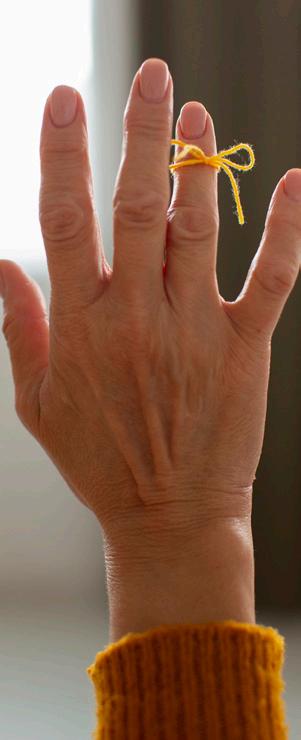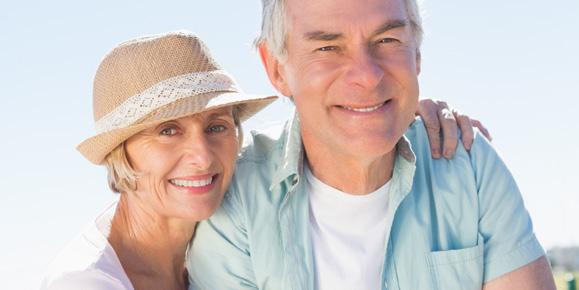




This clinic, a collaboration between the Perron Institute and Parkinson’s WA commenced in July 2024.
The clinic’s main objective is to provide information and guidance during the first few weeks after a diagnosis, to find the best possible pathway to coping with Parkinson’s and optimising every aspect of support available.
An essential component of the clinic is rapid access. It is conducted from 10:30am on the second Thursday of each month at the Perron Institute, in the ground floor of the Ralph and
Patricia Sarich Neurosciences building at the QEII Medical Centre. A referral is required from a GP or Specialist. When that has been received, the aim is to attend the next clinic. The clinic is free; however a Medicare Card is required.
The team includes;
Two Parkinson’s Nurse Specialists; Sheree Ambrosini from Parkinson’s WA and Alexa Jefferson from the Perron Institute. The other members from the Perron Institute are the Senior Research Physiotherapist Claire Tucak, Perron Clinic Co-ordinator (and physiotherapist) Sue Walters and neurologist living with Parkinson’s,
LOCATION/POSTAL ADDRESS
The Niche, 11 Aberdare Road, Nedlands, WA 6009
TELEPHONE (08) 6457 7373
FAX (08) 6457 7374
FREECALL 1800 644 189
EMAIL info@parkinsonswa.org.au
WEBSITE parkinsonswa.org.au
CHAIR
Gary Steinepreis
DEPUTY CHAIR
Professor Natalie Gasson
TREASURER
Peter Roberts
SECRETARY
Tamlyn Lennox
BOARD
Clinical Professor David Blacker, AM, Kate Roberts, Geoff Waldock
CHIEF EXECUTIVE OFFICER
Yasmin Naglazas
OFFICE MANAGER
Toby Gummer
MARKETING AND FUNDRAISING MANAGER
Kerrin Girando
FUNDRAISING AND MARKETING COORDINATOR/OFFICE ASSISTANT
Sophie Darley
FINANCE MANAGER
Salil Koonja
CLINICAL LEAD
Sheree Ambrosini
PARKINSON’S NURSE SPECIALISTS
Amanda Coultous, Fiona Roscoe, Jo Chadwick, Kayleigh Rawle, Donna Mallaby, Sheree Ambrosini
ADVERTISING ENQUIRIES
fundraising@parkinsonswa.org.au
Disclaimer - Parkinson’s Western Australia Inc has endeavoured to ensure that the information in this newsletter is accurate; however, we accept no responsibility for any errors, omissions or inaccuracies in respect to the information contained in the material provided by Parkinson’s Western Australia Inc. Nor is the provision of material by Parkinson’s Western Australia Inc. to be construed as any representation that there is no other material or information available in relation to the information provided. Further, Parkinson’s Western Australia Inc. accepts no responsibility for persons who may rely upon this information for whatever purposes.
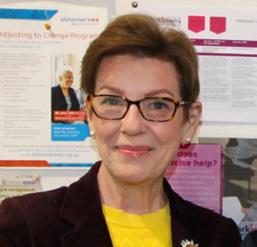
I hope this newsletter finds you refreshed, revitalised, and ready to tackle the new year! As we welcome everyone back from their well-deserved breaks, I wanted to take a moment to reflect on the incredible work we accomplished together in 2024.
First and foremost, I want to express my heartfelt gratitude to each and every one of you for your dedication, passion, and commitment to Parkinson’s WA. Your tireless efforts continue to make a tangible difference in the lives of those living with Parkinson’s, and I am honored to work alongside such a talented and compassionate team.
As we begin this new year, I am excited to share that we have a number of initiatives and projects lined up that will enable us to continue delivering high-quality services, supporting our community, and driving positive change.
Some key areas of focus for us in the coming months include:
• Implementing our new strategic plan, which will guide our work and ensure we are meeting the evolving needs of our community. Part of this will be to define a new set of organisational values;
• Reviewing service delivery models – we have evaluated the effectiveness of the current service delivery model, considering adaptations to meet growing demand while maintaining quality and efficiency;
• Securing financial sustainability - the financial health of Parkinson’s WA continues to be a key concern, with discussions around revenue streams, fundraising, and investment in growth and transformation;
• Progressing workforce planning: Strategies to address workforce shortages, particularly in recruiting specialised Parkinson’s nurses, are being explored; and
• Improving our computer systems to complement our services and programs.
One exciting initiative that we are spearheading into 2025 of the Experiential Learning Pathway: Parkinson’s Care, a tailored program designed to enhance knowledge and skills, combining carefully selected educational content and practical experiences to maximise impact and professional growth. Registered Nurses completing this pathway can apply their enhanced skills in their current workplace or pursue opportunities specifically in Parkinson’s care. the program blends hands-on experience with structured learning to ensure nurses are well-prepared to manage the complexities of care and support.
I am confident that together, we will achieve great things and make a lasting difference in the lives of those we serve.
Once again, thank you for all that you do. I am excited to see what the new year holds for us, and I look forward to working together to achieve our goals.

Adj Professor Yasmin Naglazas Chief Executive Officer
Welcome back, everyone! As we step into 2025, it’s time to gear up for another busy and productive year. I hope you all had a restful holiday season and are ready to tackle the challenges and opportunities that lie ahead.
We’re excited to let you know that our Yoga for Parkinson’s sessions will continue throughout 2025. These sessions have been incredibly beneficial for our community, helping to improve flexibility, balance, and overall well-being.
The Perron Newly Diagnosed Clinics will also be ongoing, providing essential support and information for those newly diagnosed with Parkinson’s. These clinics are a vital resource for patients and their families, offering guidance and reassurance during a challenging time.
Clinic days at The Niche will continue one day a month, providing a central location for our community to see a Parkinson’s Nurse Specialist (PNS), and the outreach clinics in Esperance, Northam, and Narrogin will continue into 2025, ensuring that our services are accessible to those living in more remote locations.
The nurses have been keeping busy in the South West and are making good use of their new office space. They are now offering clinic
days in Bunbury, along with regular community sessions and seminars. This expansion allows the Parkinson’s Nurse Specialists to reach more people and provide the education and support they need.
Keep an eye out for our expanded offerings at The Niche, where we’ll be holding seminars regularly. These seminars are a great opportunity to learn more about Parkinson’s and connect with others in the community. We also have exciting member events planned, including Twilight Sailing in February and our annual A Walk in the Park in September. These events are wonderful opportunities to come together, have fun, and support each other.
If you want any more information about these events, please contact the office or keep an eye on our social media pages.
As we embark on this new year, let’s remember the importance of all our roles in the Parkinson’s community and the impact we have on each other’s lives. Together, we can make 2025 a year of growth, collaboration, and excellence in care.
Here’s to a successful and fulfilling year ahead!
Yours,
The Nurses
My son’s name is Mark and he was diagnosed six years ago. He is now 56.
I live in a retirement village and suggested to a couple of friends from here that we walk. It was a wonderful experience and we were amazed at how many young people walked, we chatted and laughed with our many people. It really was great fun.
My husband and I had a wonderful long retirement and we travelled a lot. We saw and experienced so much.
I am blessed to have a caring family and lots of friends to share life with. I hope to be able to walk again next year.
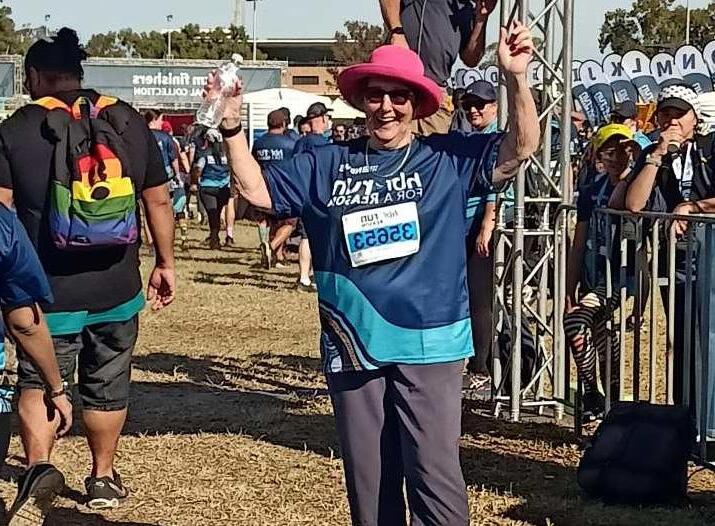
For women living with Parkinson’s, menopause can bring a unique set of challenges. As hormonal changes take place, Parkinson’s symptoms may be exacerbated, creating additional complexities to manage and it can be difficult to know whether your symptoms are due to menopause or your Parkinson’s.
The Role of Oestrogen in Parkinson’s and Menopause
Oestrogen not only affects our ovaries but plays an important role in many body functions, including protecting the brain and regulating inflammation. When Oestrogen levels drop during menopause, this can lead to increased inflammation in the body, which may increase the symptoms of Parkinson’s.
Worsening Parkinson’s Symptoms after Menopause
For women living with Parkinson’s, the hormonal changes of menopause can affect mood, cognition, and cause muscle pains. These changes can also worsen Parkinson’s symptoms, creating a compound effect. For example, sleep disturbances caused by hot flushes may make it even harder to manage the fatigue commonly associated with Parkinson’s.
A survey conducted in The Netherlands found that two-thirds of women diagnosed with Parkinson’s reported a worsening of symptoms after menopause. The most frequently reported issues were fatigue (45%), urinary tract problems (42%), and a decline in the effectiveness of Parkinson’s medications. Specific Parkinson’s symptoms that worsened included bradykinesia (slowness of movement) in 23% of women and tremor in 19%.
For women with Parkinson’s, tracking menopause symptoms can provide a clearer understanding of how hormonal changes are affecting both Parkinson’s symptoms and overall health. By monitoring these symptoms, individuals and their healthcare team can identify patterns, manage symptoms more effectively, and tailor treatment plans for optimal care.
Managing Menopause Symptoms: Hormone Replacement Therapy (HRT) Hormone Replacement Therapy (HRT) is the
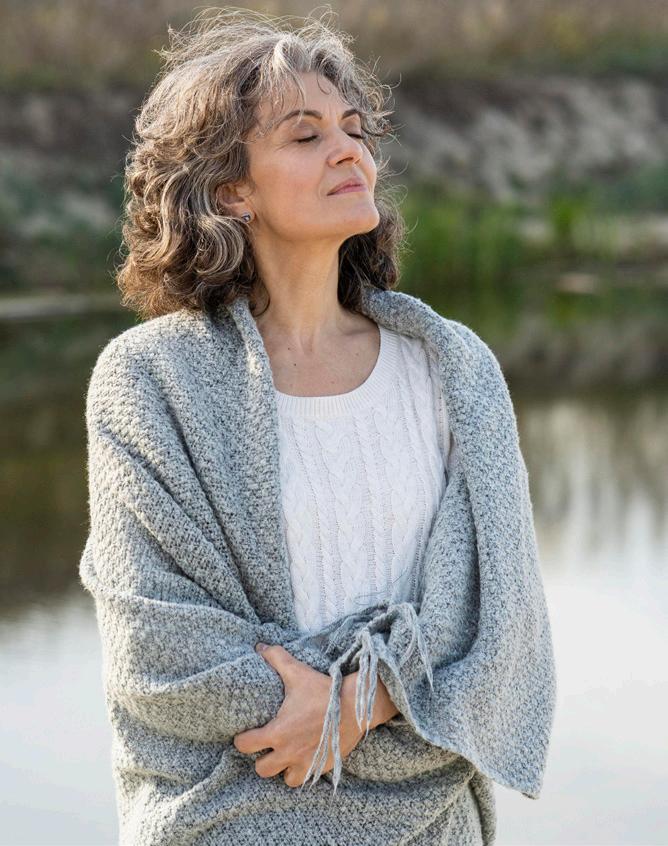
most widely recommended treatment for alleviating menopause symptoms, as it replaces the hormones your body is no longer producing. HRT can be particularly effective in managing hot flushes, mood swings, and sleep disturbances. Research into the specific effects of HRT on Parkinson’s is limited, but existing studies show that HRT can be safely used alongside most Parkinson’s medications.
Lifestyle Adjustments for Managing Both Conditions
In addition to HRT, making some lifestyle changes is essential for managing the symptoms of both menopause and Parkinson’s. Staying physically active and eating a balanced diet are key factors in improving your overall well-being.
Ensuring that you get enough calcium and Vitamin D is particularly important, as Parkinson’s increases the risk of Osteoporosis, and women are more susceptible to bone loss during and after menopause.
Weight-bearing exercises such as brisk walking and dancing can help improve bone strength and support your mental health, whilst reducing alcohol intake may help alleviate hot flushes and improve sleep quality.
Conclusion
Understanding how menopause overlaps with Parkinson’s and taking proactive steps to manage the symptoms can make a significant
Dear Nurses,
I have Parkinson’s and often find myself struggling with public speaking. Despite my best efforts, I tend to think more slowly and have trouble finding the right words or keeping up with my thoughts. This really affects my confidence and social activities. It’s been quite frustrating and has made me hesitant to engage in situations where I need to speak in front of others. Could you please provide some tips to help me improve my public speaking skills and manage these challenges?
Sincerely, Speechless in
Dear Speechless in Sorrento,
Thank you for reaching out. It’s completely understandable to feel anxious about public speaking, especially when you’re dealing with slower thinking. Here are a few tips that might help:
» Practice regularly. Rehearse your speech multiple times. Familiarity with your content can boost your confidence.
» Use visual aids like slides or cue cards to help you stay on track and remember key points.
» Mindfulness techniques such as deep breathing and mindfulness exercises can help calm your nerves before speaking.
» Break your speech into smaller sections and focus on one section at a time.
» Seek support by joining a support group or working with a Speech Pathologist for additional strategies and encouragement.
Remember, it’s okay to pause and collect your thoughts during your speech. With practice and the right strategies, you’ll find your confidence growing.
Yours, The Nurses
difference in maintaining your quality of life. By tracking symptoms, understanding the impact of hormonal changes, and considering treatments like HRT, women with Parkinson’s can better navigate this stage of life. Incorporating exercise, nutrition, and stress reduction can also make a significant impact on your quality of life. Always consult with your GP or specialist to discuss the best options for your specific needs.
Kayleigh Rawle R.N. Parkinson’s Nurse Specialist
Reference Verhoeven, J., Goedee, M., & Keus, S. H. J. (2021). Women and PD: Experienced changes in Parkinson’s symptoms after menopause. Movement Disorders, 36(Suppl 1).
Parkinson’s WA has had a lot of interest in more recent times to support beginning and advanced research, with an opportunity for funds from the established Zrinski Foundation, a generous donation from the Zrinski family with the intention of supporting research into Parkinson’s in WA.
Consistent with the interest from researchers and consortiums, the levels of approval for PWA to support research have been redefined:
• LEVEL 1 - Fast Tracked Projects (reviewed by the PWA Research Committee Chair and Senior Nurse, drawing on committee expertise when needed). These are projects that are looking for advertising via PWA’s social media channels specifically, and not necessarily seeking funding support;
• LEVEL 2 - Seeding Grant Projects (up to $10K) (reviewed by the PWA Research Committee by circular resolution); approval or otherwise to be ratified by the Board of PWA; and
• LEVEL 3 - Zrinski Grants ($10K+) (to be reviewed by the PWA Research Committee at a scheduled meeting); approval or otherwise to be ratified by the Board of PWA.
Towards the end of 2024, Parkinson’s WA issued a call for Expressions of Interest, inviting applications for research funding and scholarships for the 2024/2025 period. We received 15 proposals, and a short-listing resulted in 9 proposals being shortlisted and further reviewed by the PWA Research Committee. The announcement of successful research that will be funded by PWA will take place in February 2025.

An exciting development in 2025 will be the establishment of PWA’s new research web page devoted to all aspects of research from PWA’s perspective.
Some of the research that PWA will be supporting into 2025 is:
• AUS-mTBI Study: Improving outcomes for people with a concussion: the AUS-mTBI study and app using HeadCheck.
• The Mediating Role of Self-Esteem on the Relationship Between Body Image and Social Engagement in Parkinson’s.
• Communicating with Health Professionals: The Perspective of People with Parkinson’s.
• Strategies used by People with Parkinson’s and their Partners in Conversation: A Qualitative Exploration of their Lived.
• Co-Designing Therapy Approaches for Conversations Between People with Parkinson’s and Their Partners – Phase 3.
• Exploring the Relationship Between a Neurotrophic Factor in The Blood and Symptoms of Parkinson’s.
Living with Parkinson’s means taking extra care of your health, and that includes protecting your skin from the sun. Some Parkinson’s medications can make your skin more sensitive to sunlight, so it’s important to be mindful of sun exposure and remember that it is more important to use sunscreen regularly to protect against harmful UV rays.
As we head into Summer, remember to apply broad-spectrum sunscreen with at least SPF 30, wear protective clothing, hats, and sunglasses, and seek shade during peak sun hours (10 AM - 4 PM). Don’t forget to stay hydrated and reapply sunscreen every two hours.
How do we live well with Parkinson’s?
A word we hear a lot these days is ‘Wellness’. So, what is the concept of ‘Wellness’?
Wellness is defined by the World Health Organisation (WHO) as “the optimal state of health for an individual and groups”. When we look at health, it is not simply an absence of illness, but as a complete state of physical, mental and social well-being.
With people with Parkinson’s it is easy to focus on the management of motor-symptoms such as tremor, rigidity, slowness of movement and preventing falls. However, it’s important to look at, not just the motor and non-motor symptoms of Parkinson’s. We know some of these as constipation, sleep challenges and mood challenges but as a holistic individualised personcentred approach.
In other words, what is important to you? It is important to ask this question, so you can become the best version of yourself.
In doing this we need to consider lifestyle, culture, environment, social support and spiritual, mental, and physical wellbeing.
When looking at our optimal state of health, we want to look at all our body systems.
I often get asked. ‘Why do I need a hearing check?’, ‘Why should I be having sleep studies?’, ‘Why exercise, if I already feel fatigued all the time?’.
We often become focused on Parkinson’s, however it’s important to remember the rest of the body and our general medical checks. We should consider our bone health, gut health, dentition, hearing and vision. Acknowledging and addressing these general medical considerations are important for overall improved quality of life. Completing hearing checks and possibly obtaining aids can help with communication barriers and conversations with loved ones.
Sleep studies may identify some background sleep
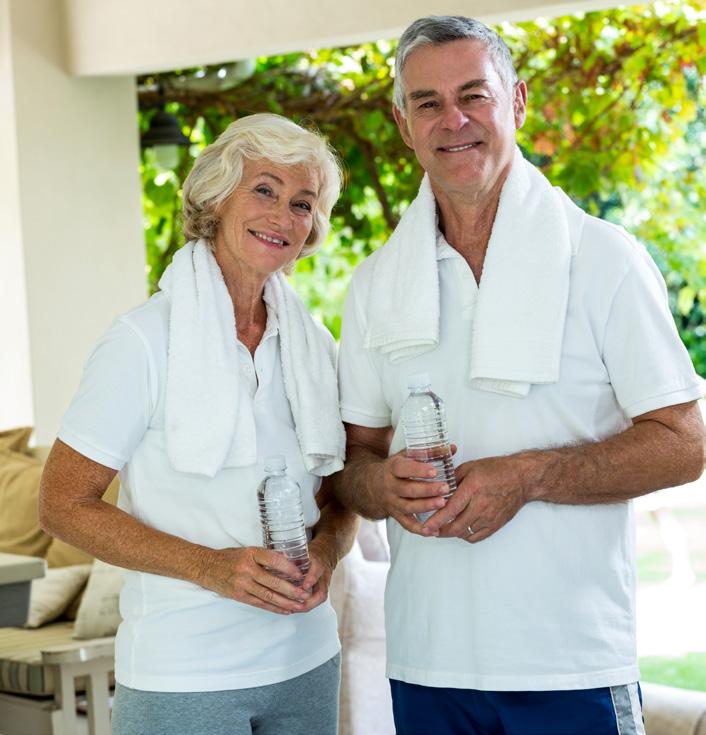
challenges that may need investigation. We all know how good we feel after a good night’s sleep. Good dentition is important not just for eating and drinking, but for good quality speech and overall health.
Many of you are aware of the many avenues of research regarding Parkinson’s and optimising gut health with the use of probiotic foods such as fermented foods, various fruit and vegetables and minimising processed foods. All these factors assist to increase your gut microbiome therefore potentially enhancing your dopamine uptake.
For people with Parkinson’s, the key components of wellness are a healthy diet, exercise, sleep and mind–body approaches such as positive thinking, meditation, reading, walking, exercise and social connection. We sometimes forget the importance of social connection, reaching out to your local support group, friends, men’s shed and book club, can really enhance your overall quality of life.
Stress-reduction plays an integral part in managing your Parkinson’s symptoms. Whether that be meditation, yoga, pranayama (breathing exercises), walking or swimming. My usual advice is do something you love, and you will do it forever.
So how can we achieve these things? Firstly, complete the investigations that your medical practitioner may have advised. If they haven’t advised them, advocate for yourself. Ask about
continued on page 8...
...continued from page 7
your bone health, hearing, vision, gut health and sleep concerns when you next visit your GP.
Most importantly be kind to yourself, prioritise you and your health. Take small daily steps whether it be, taking a walk in nature, attend a Parkinson’s yoga class or support group, complete a crossword, or try making some fermented foods or attending to your vegetable patch.
We can all achieve a state of wellness with daily individualised goals to not just survive but thrive in life.
Until next time, and hopefully, I’ll see you out there.
Donna Mallaby R.N. Parkinson’s Nurse Specialist
Want a 2-minute preparation recipe that can reduce constipation, increase your daily fibre and support your heart and bone health? Read on!
Ingredients
2-3 tablespoons of Chia seeds
½ tsp of vanilla extract
1 tsp honey
½ cup of milk of choice (coconut flavour use coconut milk)
½ tsp cinnamon
Pinch of salt
Method:
Mix all ingredients together in a glass jar or small bowl with lid and place in fridge overnight.
Topping:
2 tablespoons of Greek yoghurt Seasonal berries/nuts (Fresh or frozen)
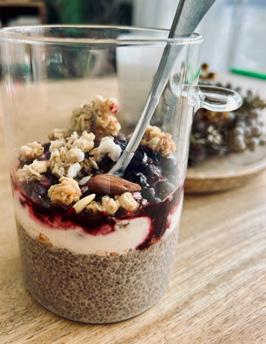
Serve in the morning with your choice of topping and an extra drizzle of honey.
(08) 6457 7373
supportgroups@parkinsonswa.org.au www.parkinsonswa.org.au/supportgroups
Initial Impressions:
• How did you feel before attending the clinic and how do you feel now?
Since my diagnosis and before attending the Newly Diagnosed Clinic I had been feeling confused and had many unanswered questions. There is plenty of information on the internet about Parkinson’s, but it was overwhelming and difficult to absorb into a brain already affected by the illness, dealing with anxiety, sleeplessness, and cognitive changes.
I feel much more at ease and able to cope now from information gained and questions answered at the clinic. Listening to those with lived experience made me feel less alone and that what I was feeling and experiencing was normal, and that it takes time to adjust.
• Was there any specific information that you found particularly helpful or comforting today?
There were brochures and information available,
as well as details for support groups and organisations. At the clinic I learnt about some great podcasts to listen to such as “Movers and Shakers” and “Two Parkies in a Pod” I found these to inform in a way that was positive and easy to understand, and even support people find them entertaining. I also found it helpful to hear of work being done on finding a cure and improving treatments from Dr Blacker.
• Did the clinic help you understand your Parkinson’s diagnosis better? If so, how?
Yes, the information given was put forward in a way that was easy to understand and there were opportunities to talk to the physiotherapist, Parkinson’s nurses, and those with lived experience at the end of the clinic. I learnt about what to expect, what strategies can help, the importance of exercise and diet, medication management, and the importance of staying connected with friends and family, as well as others with Parkinson’s for support.
Support and Resources:
• Did you find the combination of the Parkinson’s Nurse Specialist, physiotherapists, and lived experience from the buddy helpful?
Yes, I thought it was a great combination and everyone had something valuable to contribute. I learnt that multidisciplinary care is important and that the initial stages of Parkinson’s can involve emotional challenges. Having people there with lived experiences gave me a genuine outlook of their experiences, that was reassuring and informative. As it was an informal and relaxed environment, I felt comfortable asking questions.
The Buddy System:
• What was your experience with the buddy system? Did speaking with someone living with Parkinson’s help you feel more supported?
I found it very informative listening to Alan at the clinic talk about his experiences when getting his first symptoms, through diagnosis and his current day to day experiences, and there were things I related to since my symptoms started. It was also great to hear from Alan’s wife at the clinic talking about her experiences as a partner and support person of someone with Parkinson’s. I’ve learnt the importance of sharing experiences and learning from others.
• Is there a message you would like to give to the buddy you met?
Thanks for taking the time to come along to the clinic and for taking the time to chat to me since. It was comforting and helpful listening to you speak openly about your Parkinson’s journey and thanks for helping me find a good support network.
Practical support
• Was there any advice from the physiotherapists on movement or daily activities that you found easy to apply?
The physiotherapist explained the importance of movement and exercise and why it was so important, I need to focus on keeping my arms moving when I walk as my right arm in particular, keeps forgetting this.
• Do you feel prepared to manage the early stages of Parkinson’s with the information and support you’ve received today?
I feel much better prepared to manage the early stages of Parkinson’s now, as I feel more aware and informed, and know where to find resources that will be beneficial going forward.
Feedback on the Clinic:
• Is there anything you wish had been covered in more detail or differently during the clinic?
I think these clinics would be beneficial as soon as

possible after diagnosis from the Neurologist.
• Would you recommend this early access support clinic to others newly diagnosed with Parkinson’s?
I would recommend the clinic to anyone newly diagnosed as its valuable when navigating a complex condition with many questions and concerns. I feel much more knowledgeable about Parkinson’s myself, but also confident to inform family and friends about different aspects of the illness. I feel less isolated being able to educate others and having answers to questions they might have.
• How did you feel about sharing your experiences with someone newly diagnosed with Parkinson’s? This is something I was comfortable to do as it was something that I did not have easy access to when I was diagnosed. I believe people who have been newly diagnosed benefit from hearing firsthand from fellow Parkinson’s patients.
• Were there any specific moments or conversations during the clinic that you found particularly impactful or emotional?
Not one particular aspect, but you could sense the loneliness and fear that people in the room felt around their diagnosis and an unknown future. As the session progressed, you could see that people appreciated the level of support available.
• Do you feel that the buddy system provided valuable support to the newly diagnosed participant? If so, how?
Yes, as they were provided information from a panel of experts and from fellow Parkinson’s patients.
continued on page 10...
• What do you think was the most helpful piece of advice you shared with the participant?
To trust your Neurologist and care team and to work with them to dare to dream rather than fear the unknown.
Clinic Feedback:
• How well did you feel the clinic addressed the needs of the newly diagnosed participant, both in terms of medical information and emotional support?
I thought they provided a lot of details that would help the newly diagnosed, from the importance of diet and exercise to understanding more about the disease itself.
Reflection on the Early Stages of Parkinson’s:
• Looking back at your own experience of being diagnosed, what do you think would have helped you more at that early stage?
I was diagnosed during lockdowns in the UK in 2020/21, so was left feeling alone and fearing the future. Knowing more about role of exercise, diet, medications and trusting your Neurologist to push you with moving your body more would have made a difference.
• How did the support from the clinic today compare to your own experience when you were newly diagnosed?
It was better, helped by Dr Blacker, who is both a Neurologist and patient and thus his insights make a huge difference. I found his knowledge, empathy and drive provided an inspiration to me and to others.
Long-term Support and Engagement:
• Do you think the buddy system should continue after the clinic visit, perhaps in follow-up meetings or through ongoing communication? If so, how would that look?
Yes, there should be support from diagnosis to all stages of each person’s Parkinson’s journey. However, it is hard to balance, as there are many support groups across WA, but they are not joined up or able to support all the people that need them. I am involved in 2, where as a group living with Parkinson’s, we help people to have access to information but more importantly access to friendship, These support groups have been invaluable to me and others but a lack of resources across all areas means that we have learned as a group and they are very much designed in the style of the participants and we have been able to create a positive platform and experience, despite us all facing challenges in
our lives from living with Parkinson’s. I believe all patients and their families should have access to support groups that work for their needs. The challenge will be to ensure all Parkinson’s patients have access to the same levels of support and especially when they need it. For those not ready or able to join a support group, then they should be allowed to attend more than one buddy sessions, or we look to expand the buddy system, if it is required, to capture the needs of all.
• How can the clinic ensure that both newly diagnosed individuals and their buddies continue to feel connected and supported after the initial visit?
The long-term goal needs to be for all patients to have access to support groups, where all members of the group share their experiences and work to help each other and our families as we face up to challenges. The groups will give each person access to the concept of buddies for their entire Parkinson’s journey. This is a big challenge for the state of WA, as it faces what is a growing and significant health care challenge from Parkinson’s. In the short term, the clinic needs to find a way to support people and gather feedback, so it is something that works for as many people as possible.
• Has being a buddy and supporting someone else helped you in your own journey with Parkinson’s? If so, how?
Not specifically, with regards to the buddy group, but being part of growing 2 support groups has, as I have seen the benefit this has had on me and the members of the group. One of the newly diagnosed patients from the buddy group came along to the support group and he has benefitted from both the buddy service and being introduced to a wider group. I believe each person’s journey is personal and you need to make sure people know that there are people to talk too and that there are people like you out there. I have hugely benefited from that and have been fortunate that I have developed some friendships in our community.
• What further resources or tools could have been made available to help you provide even better support to someone newly diagnosed?
I thought the sessions were very informative, though each person newly diagnosed is different and you need to try to support them when they are ready and not to make anyone feel under pressure.
Parkinson’s WA has experienced one of its busiest years yet, driven by a growing number of diagnoses across the state, particularly in regional Western Australia.
In response, we have been expanding our services, and we are immensely grateful for the support we’ve received from the McCusker Foundation. Their generous pledge has made a significant difference, especially in regional areas, where access to care is often limited.
The number of individuals diagnosed with Parkinson’s in WA continues to rise each year, and our services are adapting to meet this demand. The data below highlights the number of active clients we currently support across various regions of WA:
The new office also serves as a base for our support groups and a hub for our carers’ support programs. As a result, individuals living with Parkinson’s in regional WA now have even more opportunities to connect, share experiences, and access essential services.
In the South West Inland region, the area served by the McCusker Foundation Parkinson’s Specialist Nurse, we’ve seen an increase of about 14% in the number of active clients compared to the previous year. In 2024 alone, over 312 new referrals were made to see the McCusker Foundation Parkinson’s Nurse, demonstrating the rising need for specialised care.
This increased demand has underscored the importance of continued support from the McCusker Foundation. Many of the individuals we serve live on remote farms or in other hardto-reach areas, and your ongoing support will enable us to continue delivering the vital care they need.
We are deeply grateful to the McCusker Foundation for its commitment to improving the lives of those living with Parkinson’s in regional Western Australia. Your pledge is making a real and lasting difference, and we look forward to continuing our partnership in responding to the growing needs of these communities.
Thank you for helping us bring care and support to those who need it most.
Thanks to the McCusker Foundation’s support, we’ve been able to significantly enhance the care we provide to those living with Parkinson’s in regional WA, particularly in the South West. This support has allowed us to establish a new office, funded by Parkinson’s WA reserves, which has opened the door for clinic appointments in addition to our home visiting services. This is a vital step in ensuring people in remote areas can access care closer to home.
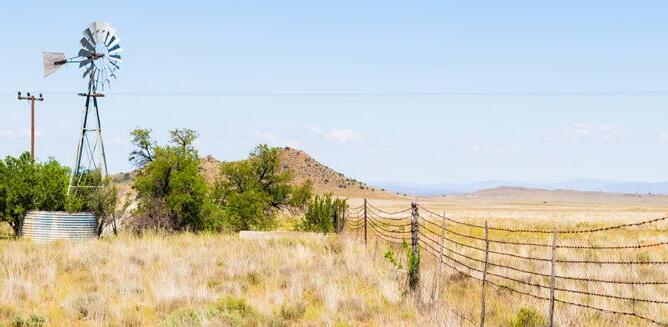
David Blacker. Additionally, one or two “Parkinson’s Buddies” attend, from a group of about 10 people with Parkinson’s who have lived with Parkinson’s for a couple of years or more. The Parkinson’s Buddies have kindly attended and shared their experiences to help with the newly diagnosed people. The input from the Parkinson’s Buddies has been particularly valuable, and several of the buddies themselves have said they feel like they have benefitted personally from attending and helping out.
The sessions begin with introductions, then short presentations by the team members. Information sheets covering a wide range of topics are provided. Most of the time is spent answering questions and sharing experiences. There is flexibility to allow for as long as needed for this. Spouses and carers have also actively joined the discussions. Attendees are also linked in to the Parkinson’s WA home visiting Parkinson’s Nurse Specialist program for ongoing follow up.
The clinic has started small, with about 3 to 5 newly diagnosed people with Parkinson’s attending each clinic, usually with a support person. There is capability to expand these numbers, especially now the format has become well established.

Parkinson’s Western Australia is thrilled to announce that we have been selected as one of the two charities in WA to be a part of Beyond Bank’s Double Donation event.
During April 2025, Beyond Bank will nominate two days (48 hours) where they’ll match donations made to Parkinson’s WA via the Beyond Bank website, up to a total of $10,000.
The Double Donation event is a fantastic way for Parkinson’s WA to raise $20,000 to support all work we do in the community. Keep an eye out on our social media and in your emails, we can’t wait for you all to be part of the event.
Goals for 2025 include;
• to try and see people with Parkinson’s as soon as possible after diagnosis
• increase awareness amongst referrers and clarify this is a “one off” semi-urgent referral to assist in the early stages (not a chronic clinic)
• collect feedback and suggestions from participants
• consider possibilities for collaborative research
• consider tele-health component
The sessions have generally felt very positive, generating a sense of camaraderie and optimism. For some years I have received regular calls from newly diagnosed people with Parkinson’s and their families, desperately seeking the advice and services offered by this clinic. It is satisfying to now have this freely available to all those who need it.
For further information and bookings contact; susan.walters@health.wa.gov.au
David Blacker
Perron Institute’s Medical Director Parkinson’s WA Board Director
Parkinson’s WA acknowledges the donations that have been given by families and friends in lieu of flowers at their funeral in memory of the following people. The thoughtfulness of these families for arranging for the donations to be given to Parkinson’s is greatly appreciated.
Please reach out to the us if you would like to set up a digital fundraising page or an In Memory donation box to honour your loved one.
Carmody
For many, the idea of fundraising goes beyond simply collecting money—it becomes a deeply personal mission that touches the heart and soul. For one passionate supporter of Parkinson’s WA, the reason for raising funds is profoundly personal.
“My partner, Roger, was diagnosed with Parkinson’s in 2006,” shares Deanne. “I decided to support Parkinson’s WA to help others who are facing the same challenges we do daily.” For this dedicated individual, the fight against Parkinson’s is not just a cause, it’s a journey with her partner that continues to inspire and motivate her.
But it’s not just about the cause, it’s about the joy of giving back. When asked what part of fundraising Deanne enjoys the most, she says, “I love making handmade cards. It’s so therapeutic and relaxing. To be able to sell them and raise money for Parkinson’s WA is a win for me and a win for Parkinson’s WA.” It’s a simple yet beautiful way to combine creativity with charity, something she finds incredibly fulfilling.
Deanne’s inspiration to fundraise comes from both a personal and creative place. “My hobby of creating handmade cards inspired me to raise
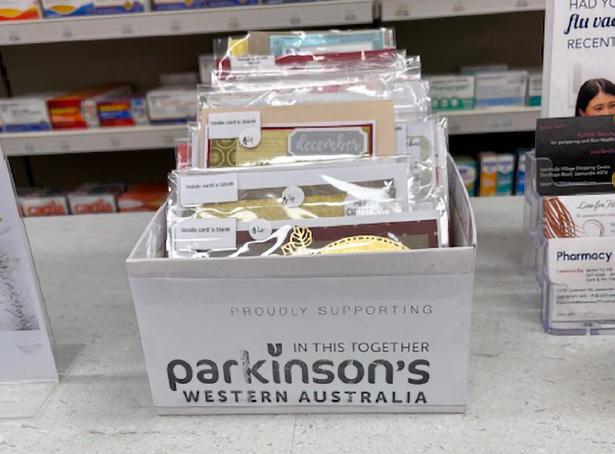
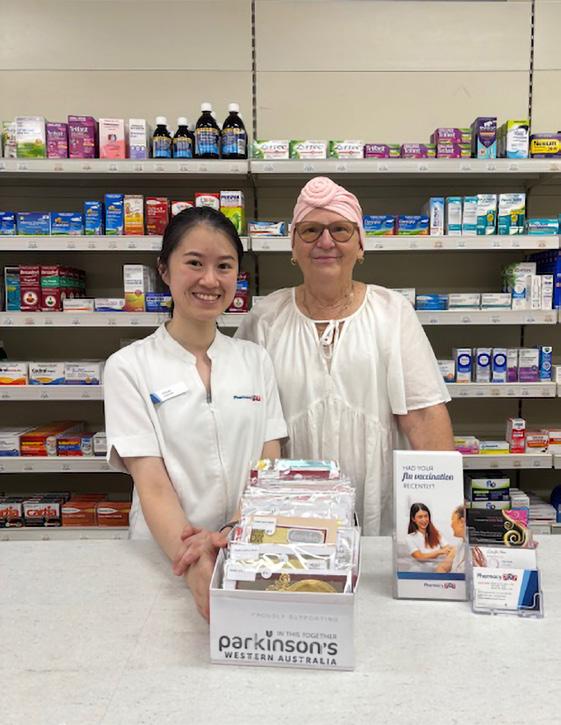
funds, and of course, my partner Roger has always been my driving force. His strength keeps me motivated.”
“I’ve learned that people will forget what you said, people will forget what you did, but people will never forget how you made them feel.”
This quote holds great meaning for Deanne, “It’s a reminder that our actions and words may fade, but how we make others feel is what truly matters. It’s something I keep in mind every day as I work to support Parkinson’s WA.”
Through every handmade card, every moment spent with her partner Roger, and every effort to fundraise, this amazing individual continues to make a difference in the fight against Parkinson’s. Her story is a beautiful example of how love, creativity, and community can come together to make a lasting impact.

The Annual Parkinson’s WA Awards was celebrated with four very worthy winners who were presented with their accolades at the 2024 Parkinson’s WA AGM. The Awards are an annual event that allows PWA to formally recognise those individuals or groups that have contributed in a positive way to the PWA cause.
Awarded annually to an individual/collective group that strives to bring positive change to the Parkinson’s community in WA by having a noteworthy involvement in the Parkinson’s community, making a significant impact that adds value to the Parkinson’s Community life and demonstrates inspiring efforts to enhance the Parkinson’s community. All this is undertaken with selfless dedication, hard work, generosity and kindness.
Kirsten has recently volunteered her expertise to redefine yoga and wellness, creating tailored programs that help individuals take their first steps toward broader community-based initiatives. Her personalised approach begins with comprehensive assessments of movement, balance, and health history to ensure each session meets individual needs. The weekly sessions focus on balance, flexibility, posture, and mobility, providing participants with tools to enhance physical well-being and confidence. Beyond the mat, Kirsten fosters a supportive space for connection, offering personal touches like homemade cakes, which have built a strong sense of community. Combining clinical knowledge of Parkinson’s with a generous spirit, Kirsten’s compassionate approach leaves a lasting impact on her participants, enriching their lives with kindness, encouragement, and a renewed sense of possibility.

Awarded annually to a health professional who makes an outstanding contribution to clinical excellence, leadership, education, and culture in caring for those individuals living with Parkinson’s. They advocate for evidence-based practice, focus on value-based support and provide safe, quality, and compassionate patient care. They show commitment to supporting, empowering, and upskilling those around them.
WINNER: Wayne Rosen
A qualified physiotherapist with over a decade of experience working with Medtronic DBS, plays a crucial role in supporting Parkinson’s WA (PWA) by providing expert education on Deep Brain Stimulation (DBS) therapy. His extensive knowledge helps equip Parkinson’s Nurse Specialists to guide patients through the complexities of DBS, which manages movement symptoms like tremors. Known for his approachable demeanor, Wayne goes above and beyond to offer ongoing support to both patients and healthcare professionals, earning respect from his peers. His commitment to patientcentred care and his ability to foster trust and confidence make him an invaluable resource in the Parkinson’s community, contributing to improved clinical outcomes and patient well-being.
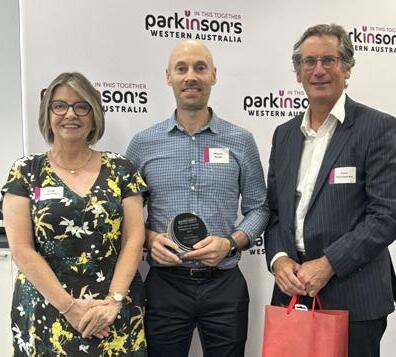
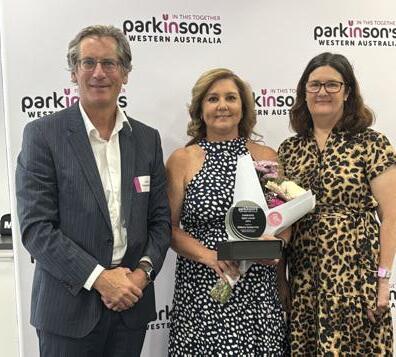
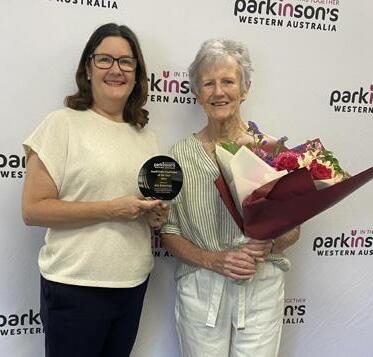
Awarded annually for a demonstration of ‘spirit of service’ and citizenship, recognising and honouring an exceptional individual/group of individuals who make ‘giving back’ to the Parkinson’s community a way of life. They have a positive impact upon the direction and success of Parkinson’s WA’s mission and strategic direction, and improve the life of others.
WINNER: Rebecca Baskerville
Living with Parkinson’s herself, Rebecca has made a profound impact on others by fostering a supportive community for those with earlyonset Parkinson’s in Mandurah and surrounding areas. She organises regular gatherings where individuals can share experiences and navigate challenges such as NDIS and physiotherapy. Known for her compassion, Rebecca goes above and beyond to support others, including rearranging her own appointments to assist a newly diagnosed group member. Passionate about raising awareness, she openly shares her journey on social media, offering reassurance and guidance to those newly diagnosed. Rebecca’s advocacy extends to creative expressions, such as writing a heartfelt poem and sharing her story with Parkinson’s WA for campaigns and fundraising. Her dedication and genuine care have left a lasting impact on many lives.
Named in honour of a Parkinson’s WA former treasurer Geoff Pride who served the organisation for 16 years, this award recognises hard work and creativity in fundraising ventures in partnership with PWA, based on an uncompromising commitment to ethical standards and timeliness of funds donation.
Sue is a passionate fundraiser who organises creative events, including curry nights, dinners, and raffles, to raise funds for Parkinson’s WA and other causes. After her diagnosis in 2017, she became dedicated to giving back to her community, volunteering at the Dandaragan Op Shop and advocating for donations to PWA. Her optimism and determination inspire others, making her events a cornerstone of local support. Known for her meticulous planning and positive spirit, Sue has become a beacon of hope and resilience, fostering a strong sense of community while raising vital funds to support those living with Parkinson’s.

A unique collaboration between former national and Golden Gloves Champion and well known boxing trainer, Rai Fazio, and Neurologist, Professor David Blacker has led to the formation of an exercise program for Parkinson’s now available for in person training in Perth, and in an on-line format. (See faziospdfighters.com)
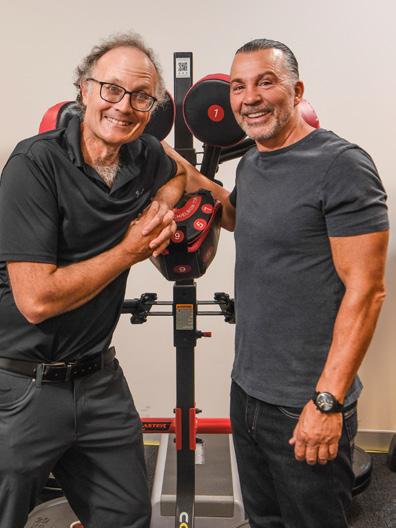
The program is based upon the “Feasibility of instituting graduated high intensity training” (FIGHT-PD) study, published in the Journal of Physical Medicine and Rehabilitation in January 2024. In late 2019, Rai and David were introduced by mutual contacts at the Perron Institute for neurological and translational science. David, a neurologist who has young onset Parkinson’s, undertook Rai’s boxing training program, and experienced a clear improvement in his Parkinson’s symptoms. This inspired the study, conducted in collaboration with the exercise physiologist, Dr Travis Cruickshank from Edith Cowan University. Whilst there had been
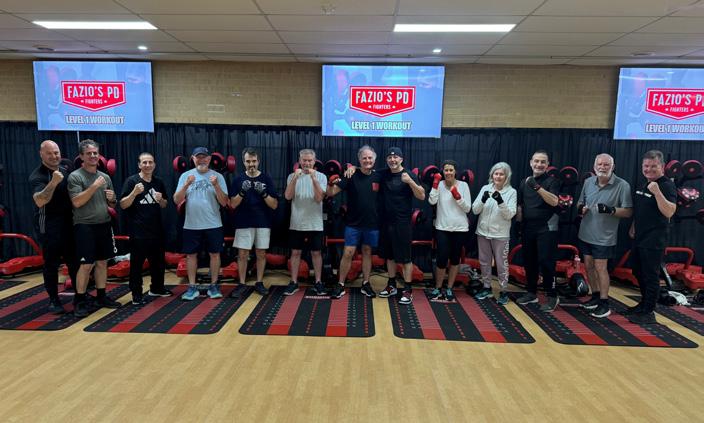
previous descriptive studies on boxing training for Parkinson’s, none had used measures to record exercise intensity, nor included a detailed protocol. FIGHT-PD demonstrated that a group of people with early stage Parkinson’s, could safely be built up to three, one hour sessions per week of high intensity training. The study results have formed the basis of a program that commenced group classes in November 2024 at the Loftus Centre. The City of Vincent has generously supplied space and time for 6, and soon 8 classes per week. The Perron Institute funded the fit out and equipment. There are now nearly 100 people with Parkinson’s participating with positive feedback and numerous testimonial reports.
Rai has trained a team of boxing coaches who are all boxers themselves (including several former champions) to allow for the program to extend more widely. The coaches provide expert tips and supervision whilst the participants follow the series of pre-recorded workouts on large screens above the FIGHTMASTER training devices. This ensures consistency and safety. Plans are well underway to establish a second community site in Joondalup in early 2025, and then Midland and Fremantle.
Training can also be undertaken by on-line at home, when a FIGHTMASTER device is purchased.
David Blacker
Perron Institute’s Medical Director Parkinson’s WA Board Director
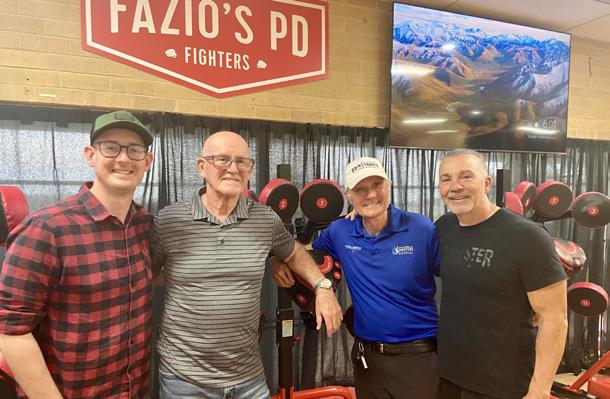
The Yahava Koffee Works Geographe Bay Swim was an unforgettable day, filled with inspiring moments and heartfelt support. Held on 16th November 2024, individuals from all over Western Australia gathered to compete, show their support, and enjoy an extraordinary event. Starting in Dunsborough, swimmers followed a 20km course toward Busselton, finishing their race at the iconic Busselton Jetty. Volunteers were stationed along the beach to ensure swimmers could safely recharge and swap over if needed.
We were honoured to be the 2024 Charity Partner for this incredible event, with nearly $5,000 raised by the swimmers and attendees in support of Parkinson’s WA. Additionally, Optus generously donated $1,000 to our cause, further strengthening the support for our vital work. We are truly thankful for their contribution. This generosity has a meaningful impact on our cause, and we are deeply grateful to everyone who contributed. Clients and Parkinson’s WA staff also graciously volunteered their time, creating one of the rare opportunities we get to work as one cohesive team. Their dedication truly brought the spirit of community to life.
A total of 450 swimmers participated in the event, with 45 people tackling the 20km course as a solo! Among them, we saw the course record smashed by Callum Greenshields with a time of 4 hours and 38 seconds, while Jasmine Wynen-Haugg claimed the women’s title, completing the course in 5 hours and 39 minutes.
The event was not only a celebration of sport but also an opportunity to raise awareness about Parkinson’s. Swimmers and attendees learned about the condition, deepening their understanding of the importance of supporting our community. For some individuals, the swim was a personal mission to support a loved one, a friend, or a community member living with
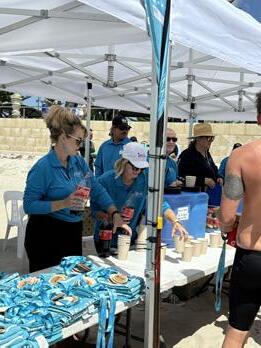
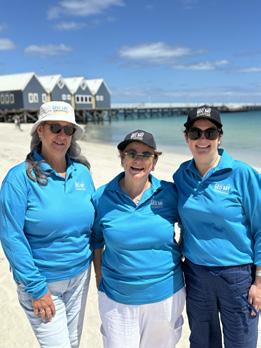
Parkinson’s. For others, it was a way to give back to the swimming community they love, while many simply wanted to show their support for family members living with the condition.
We are incredibly proud of our four dedicated participants who swam in support of Parkinson’s WA, raising vital funds for this important cause. Team ‘The Wetter the Better’ included Chenae King, Adam Gillie, Cindi Dunjey, Matthew Gillie, and Isabel Martin, who each swam to make a difference. Their effort alongside the incredible fundraising efforts of everyone involved showed the true generosity that makes events like this so special.
All in all, the day was a remarkable success, bringing together individuals from all walks of life to support a cause close to many hearts. We extend our deepest gratitude to all the participants, volunteers, and supporters who made the Yahava Koffee Works Geographe Bay Swim a day to remember. Together, we’ve taken a significant step forward in raising awareness for Parkinson’s WA and making a positive impact on the lives of those living with Parkinson’s.
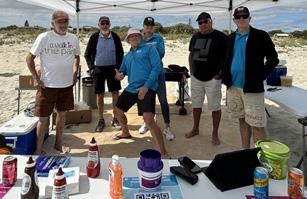
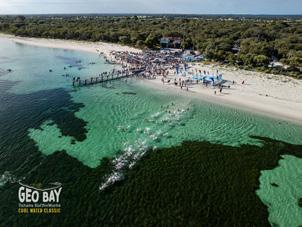
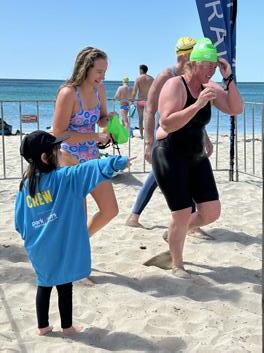
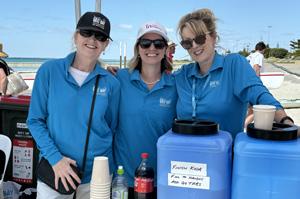
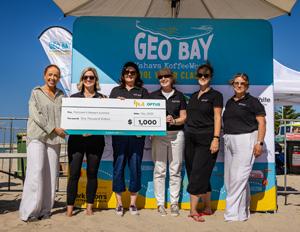
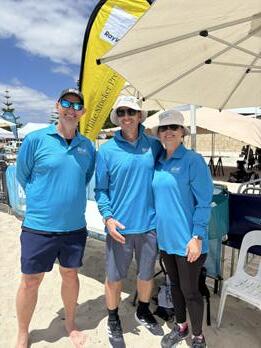
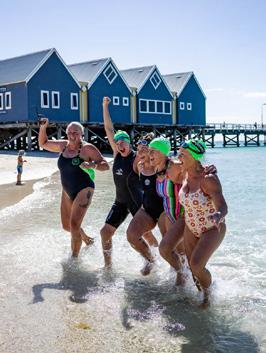

Newly Diagnosed Seminar
Saturday 15 March Assoc. Professor Rick Stell
Palliative Care WA Advanced Care Planning Thursday 3 April Sabena Lund
Palliative Care WA Practical Workshop Thursday 8 May Julia Kennington
South West Seminar Friday 14 May Dr Shannon King
Exercise and Parkinson’s - the role of the multidisciplinary team and my perspectives as a physio living with Parkinson’s
10 June
Palliative Care WA Thursday 18 September
Newly Diagnosed Seminar Thursday 23 October Dr Ghosh
for people diagnosed within the last 5 years

Saturday 15 March 2025
10:00am - 1:00pm (approx)
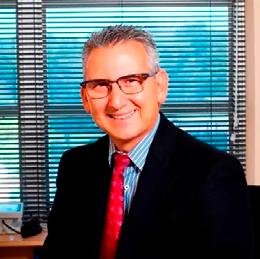
The Niche Building 11 Aberdare Road, Nedlands WA 6009 cnr Aberdare Road and Hospital Avenue, Entry via Hospital Ave
Presenters:
• Associate Professor Rick Stell
Consultant Neurologist with the Perron Institute Movement disorders clinic and St John of God Dr Stell will speak on Parkinson’s and treatment options.
• Parkinson’s Nurse Specialist panel Nurse Specialists from Parkinson’s WA.
A panel of Nurse Specialists will answer questions from the audience.
Cost: Parkinson’s WA Members: Free ; Non-Members: $20 each Morning tea provided.
RSVP: by Friday 7 March 2025 via the Parkinson’s WA website or contact the Parkinson’s WA office on (08) 6457 7373 or info@parkinsonswa.org.au
Seats are limited Please register as soon as possible to avoid disappointment
Bus Service: 24, 25, 26, 103, 998, 999, 950 and Purple Cat buses all stop within 5 minutes walking distance of the Niche.

Parking: Limited parking is available at The Niche (entry to the carpark via Hospital Ave).
Alternative parking options include nearby local street parking or the Hospital’s carpark (paid parking; entrance on Winthrop Ave).
The Niche, 11 Aberdare Road, Nedlands WA 6009 P: (08) 6457 7373 F: (08) 6457 7374 E: info@parkinsonswa.org.au www.parkinsonswa.org.au
Save the Date – Sunday 25 May 2025
It's time to find your reason and run for Parkinson’s WA at the HBF Run for a Reason. Perth's biggest community running and walking event, a wonderful day for all the family to enjoy with three distances to choose from: half marathon, 12km and 4km.
REGISTER NOW - https://loom.ly/kPnZjjY
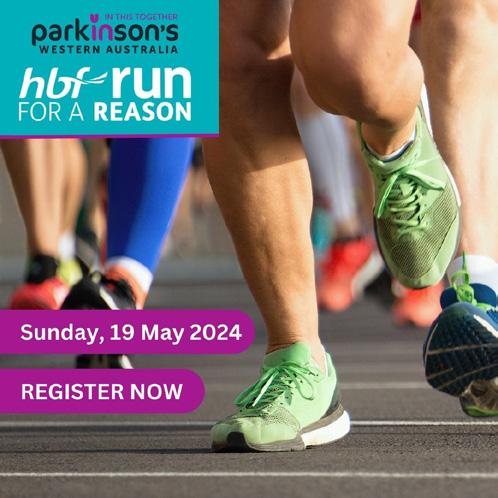
Sunday, 25 May 2025
REGISTER NOW
Why Did You Fundraise for Parkinson’s WA?
Parkinson’s has profoundly impacted my immediate family. Both my father and his only sibling, my late uncle Glenn, have faced the challenges of this condition. Before my dad’s diagnosis, I didn’t fully grasp how insidious Parkinson’s could be. However, watching his recent significant decline inspired me to take action. I wanted to spark conversation and raise funds to support others navigating this condition alongside their families.
For my fundraiser, I chose a physical challenge that reflected the importance of movement, which had been a cornerstone of my dad’s independence. When he was still somewhat self-reliant, activities like walking to the coffee shop, cycling, or attending personal training sessions significantly improved his mobility, mood, and cognition. Turning 33—the age my dad was when my parents had me—I decided to mark the milestone with a 33km run.
What Did You Love Most About Fundraising for Parkinson’s WA?
I was fortunate to have a few friends, and my brother join me on the run. Some of my favourite moments were celebrating checkpoints in fun, silly ways and passing my dad’s nursing home, where we waved as we ran by.
The finish line was a highlight: a group of wonderful supporters waited for us with cheer signs and champagne to celebrate the achievement. The overwhelming support from family, friends, and the broader community throughout the fundraiser and the run itself was humbling. It was an unforgettable experience and the best way to celebrate my birthday.
Who or What Inspired You to Fundraise for Parkinson’s WA?
My dad and my uncle were my greatest inspirations. My uncle, an active individual involved in the local footy community, and my dad, who loved walking and incidental exercise, both embodied the importance of movement. Their experiences deepened my appreciation for my ability to tackle physical challenges when others, like my dad at this

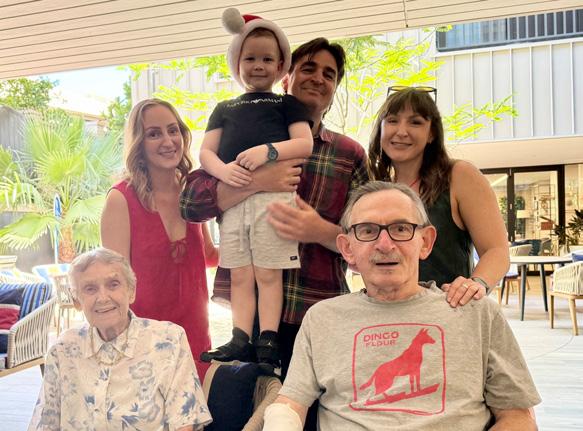
stage of his condition, may struggle with daily tasks. I’m passionate about movement that supports longterm health and mental well-being. Fundraising for Parkinson’s WA felt like a meaningful way to honour their legacies.
What’s Your Favorite Place You’ve Travelled?
Though I have many destinations yet to explore, New Zealand holds a special place in my heart. It combines everything I love: stunning landscapes, outdoor activities, and incredible food and wine. Closer to home, I recently visited Kununurra, where I explored gorges, swam in Lake Argyle, and enjoyed various hikes. Growing up in the Pilbara, this rugged landscape feels like home. Places like El Questro are otherworldly yet right here in our backyard. Western Australia’s beauty never ceases to amaze me.
What Does a Perfect Day Look Like for You?
My fundraiser was nearly the perfect day: movement, time with friends and family, a dip in the ocean, and plenty of coffee and delicious food. The coastline is my happy place, particularly Leighton Beach. Walking along the shore used to be a ritual for my dad and me, and it remains one of my fondest memories. It’s a reminder of how much joy simple moments can bring.
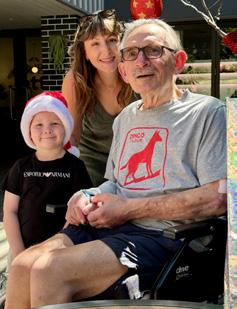
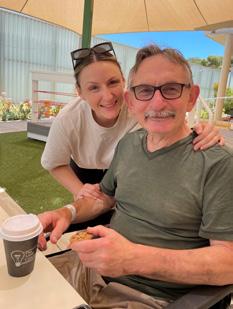
Kings
Kingsley
Midland
Western Suburbs
Carer’s
Bunbury
Bunbury
Collie
Melville
Mandurah
Mandurah
Rockingham
Rockingham Carer’s
Phone:
Busselton www.parkinsonswa.org.au/ supportgroups
Margaret River


